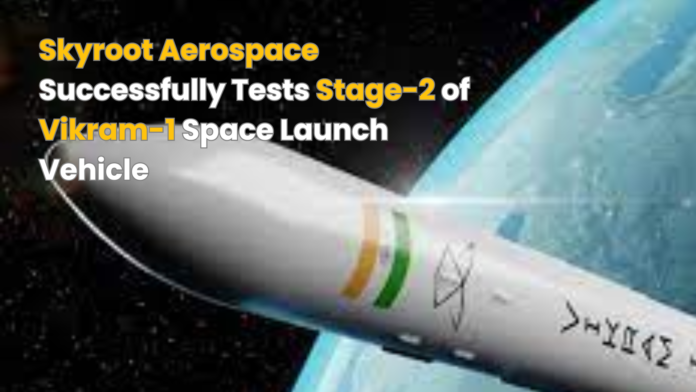Marks a giant leap toward India’s private space exploration, propelling innovation and igniting ambitions for groundbreaking orbital missions.
Skyroot Aerospace, a pioneering spacetech company, achieved a significant milestone as it successfully test-fired the Stage-2 of its Vikram-1 space launch vehicle, named Kalam-250. The test, conducted at the propulsion testbed of the Indian Space Research Organisation (ISRO) within the Satish Dhawan Space Centre (SDSC) in Sriharikota, Andhra Pradesh, marks a monumental stride for the Indian space sector.
In a press release issued on Thursday, Skyroot Aerospace highlighted the upcoming Vikram-1 launch as a landmark event, representing India’s first private orbital rocket launch. This achievement follows the commendable suborbital space launch of India’s first private rocket, the Vikram-S, by Skyroot in November 2022.
The test carried out on Wednesday, lasted 85 seconds, recording a peak sea-level thrust of 186 kilonewtons (kN), expected to translate to a fully expanded vacuum thrust of approximately 235 kN during flight. The Kalam-250, powered by a high-strength carbon composite rocket motor and utilizing solid fuel along with a high-performance Ethylene-Propylene-Diene terpolymers (EPDM) thermal protection system (TPS), demonstrates cutting-edge technology and engineering prowess.
Pawan Chandana, Co-Founder and CEO of Skyroot Aerospace hailed the successful test as a significant milestone for the Indian space industry. He emphasized that the achievement signifies the successful test of the largest propulsion system ever designed and manufactured by the Indian private sector, and notably, the first carbon composite-built motor tested at ISRO.
Naga Bharath Daka, Co-Founder and COO of Skyroot, highlighted the validation of the flex nozzle control system—an integral component for the launch—during the firing, marking a crucial milestone in the company’s journey. He expressed the team’s focus on achieving further milestones in the coming months to realize the maiden orbital launch of the Vikram-1 in 2024.
The test also benefitted from the expertise of the Vikram Sarabhai Space Centre (VSSC), another ISRO facility, which contributed its proprietary head-mounted safe arm (HMSA) for the test, essential for ensuring the safe operation of the rocket stage.
With this successful test, Skyroot Aerospace paves the way for India’s private space industry to emerge as a key player in the global space arena, showcasing innovation, technology, and capability on par with international standards.




